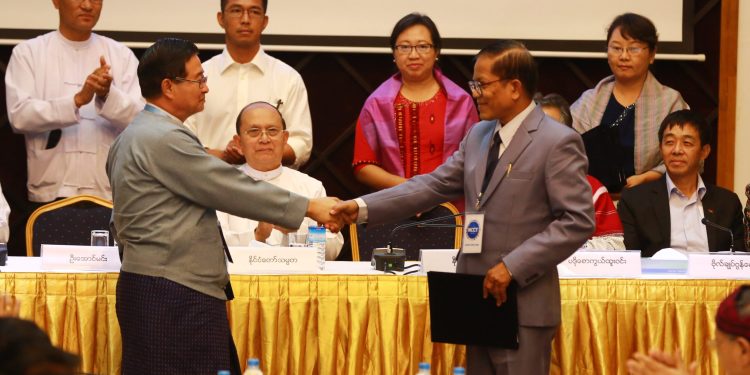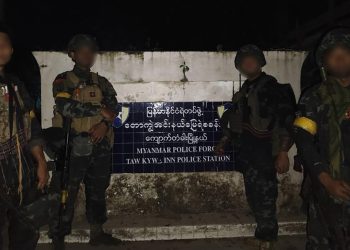Time for an Evaluation of Donor-Led Peace Efforts?
As recently as 2020 one of the most prominent logos on Yangon billboards, vehicles, and signs was the woven fibers of the Joint Peace Fund (JPF). The JPF arrived in Yangon in 2016, loudly proclaiming that it had pledges from nine western donors who would fund US$100 million in peacebuilding activities between 2016 and 2021.
The JPF would support the National Ceasefire Agreement (NCA) of 2015, a Norwegian-sponsored agreement between the quasi-civilian government of U Thein Sein and a dozen or so Ethnic Armed Organizations (EAOs). Hundreds of millions of dollars also flowed into Myanmar in the name of peace from Western embassies, United Nations (UN) agencies, the World Bank, church groups, and international non-governmental organizations (NGOs). All parties were convinced that they could contribute to the country’s road to peace by bringing the peacebuilding skills of the outside world to Myanmar.
International experts in peacebuilding, public health, gender, democracy, displaced peoples, education and a host of other subjects arrived. The Myanmar Police Force was even funded by the European Union to train in crowd control techniques in 2013 and 2016, all part of a scheme to assist them to become “a modern police agency that adheres to international standards, respects human rights and maintains gender awareness.”
Conferences were held in Yangon hotels, workshops in villages, and leaders jetted off to see ‘best practice’ peace efforts in places like Northern Ireland, Colombia, Sri Lanka, and Mindanao in the Philippines. And then of course it all disappeared on February 1, 2021, when the Myanmar military staged their coup. What went wrong? No answers seem forthcoming.
Monitoring, Evaluation and the Coup of February 1, 2021
Hundreds of millions of dollars were spent on peace and democracy efforts in Myanmar between 2016 and 2021. Myanmar’s service sector briefly flourished and rents in Yangon skyrocketed, particularly in neighborhoods favored by expatriates where houses owned by military families were snapped up. But that was OK because each dollar spent was rooted in “evidence based policy”, which meant a particular “benchmarked performance objective” pre-determined by the donor was aligned with success, however defined.
So the JPF and the donor systems hummed along, always seeming to meet those benchmarked performance indicators. The Rohingya crisis of 2017 came and went, ceasefires in Shan and Kachin States collapsed, and fighting resumed in Karen and Karenni States. The Arakan Army emerged, too. Monitoring and Evaluation officers carefully noted “roadblocks” on the “road to peace”. Ambassadors lectured Myanmar people that this was the “last chance” for peace.
But it didn’t work. The crash occurred on the day of the coup, when the elected leadership of the government was arrested and the military occupied Myanmar’s cities. Peaceful demonstrators were shot, military operations against ethnic peoples in the borderlands resumed, and resistance groups began to organize. All the efforts of the 2016-2021 peacebuilding seemed for naught. As for the evaluators, they seemed to have suddenly disappeared. For example, instead of acknowledging failure and announcing a new study in the interests of transparency, JPF’s website was scoured of all reports and effectively went blank. Or perhaps it went underground, as rumors have emerged that the JPF is now negotiating with the military government. It seems that the peacebuilding of 2016-2021 was in vain or perhaps even counter-productive.
This means, though, that it is time to ask the critical question of what went wrong. All that data- driven policy-building can be resuscitated, and the tools used to evaluate the NGOs can now be used to evaluate the overall peace process. Monitoring and Evaluation in donor-speak meant western accounting standards benchmarking every kyat and dollar. The recipients were held accountable to the stakeholders, of whom the donors were most important. This is why endless reams of the monitoring and evaluation reports were submitted to Western embassies, JPF, World Bank, and others. Receipts for tea were carefully collated with a performance objective, budget line and benchmark. Monitoring and Evaluation Officer became a new profession in Myanmar, judging by the number of job ads advertising for this particular skill.
It seems callous to ask, but isn’t the coup and the seeming collapse of the aid sector a great opportunity for a final monitoring and evaluation report? What are the lessons learned? Why did the road to peace fall off a cliff? Where did the hundreds of millions of dollars spent on peace go? Frankly were JPF still around, it seems like a perfect question for them to conduct an inquiry into.
Measuring The Technology of Peace
One problem is that the JPF and other donors reduce peace to being a technical problem. In the imported version of ‘Peaceland’, conflict, economics, and politics were reduced to metrics which are easily monitored and evaluated with numbers. Thus, violent incident reports seemed quick and precise and economic development was robustly measured in tenths of a percent growth. Election transparency was presumably measurable in the liters of purple gentian violet used to stain the fingers of voters.
The problem perhaps is that peace is not just a technical problem. Peace is complicated, because there are many forms of it and it is more than an absence of violent incidents. Indeed in peace studies, an absence of violent incidents is sometimes called “negative peace”. Myanmar people remember well “negative peace’” from the decades of military rule when fear of government violence was constant, even when there were no violent incidents to count. For negative peace to become “positive peace,” there needs to be reconciliation and the birth of a new sense of shared destiny. Peace studies scholars use mystical terms such as soul of place, cultures of peace, social cohesion, and positive peace. The point is that peace is rooted ultimately in the morality and traditions of the local society, not dollars spent, incidents counted, or even gross national product.
A Wonky Question for the Evaluators: What is Your Real Deliverable?
The monitoring and evaluation profession is about measuring progress toward a goal. Peace was the goal for the NCA but that came to mean only that violent fighting between the military and EAOs should stop, even if the reign of fear continues. Monitoring and evaluation reports, though, only asked if the shooting stopped, not if steps toward what peace studies scholars call “positive peace” were taken. The incentive presented by Western embassies and NGOs was that if you could answer ‘Yes’ that violence rates had decreased, you could get the next contract. Somehow the world of monitoring and evaluation missed the fact that assigning a cup of tea from a workshop to the correct budget category was not the point. “Positive peace” is the point, but this is unfortunately not really a deliverable that can be monitored and evaluated by simply counting violent incidents.
February 1, 2021 presents a classic monitoring and evaluation opportunity for the ‘lessons learned’ crowd. Perhaps what needs to happen is that the donors from the UN, Norway, UK and USA need to admit that the coup was a failure of their own policies, not just of the Myanmar people.
Sadly, this is not yet happening. In Thailand, where I work, USAID, Washington’s aid agency, in particular has arrived with monitoring and evaluation specialists promising dollars for programs addressing Myanmar issues. The catch is that the extensive American accountability requirements mean that the same policies and same NGOs that engineered the failure of 2016-2021 are being funded again. More importantly, the pesky goal that is “positive peace” is still missing. So NGOs spring up, monitoring and evaluation specialists are hired and villas rented in Chiangmai and Bangkok. After that is done, some money will make its way across the border to Myanmar and the rather small number of NGOs with the wherewithal and office staff to continue satisfying the technocracy of the peace industry.
What Would a Real Evaluation Look Like?
What would a real evaluation of the NCA and JPF look like? First, it might start with not just the failures in the 2015 ceasefire, but the dozens of other Myanmar ceasefires which have taken place since the 1950s. And then before that there is the poisonous legacy of British colonialism well remembered by Myanmar’s peoples. Myanmar has historians who could help with evaluating why ceasefires have been ineffective for the last 100 years or so. For example, little thought is put into why the 1950s ceasefires following the 1949 Battle of Insein failed. Nor is much written about the 1990s ceasefires with the Mon, Kachin, Wa, and others. In those failed ceasefires might be found the reason why the 2015 NCA also failed. And finally why did the Rohingya repatriations endorsed by the UN in 1978, 1992, 2012 and 2017 also fail?
If you are a foreigner scratching your head about the Battle of Insein, or other ceasefires, you are not alone. After all, what monitoring and evaluation officer created a career based on bragging about the ceasefire that did not work, even if it was one of the most important events in twentieth century Myanmar history? But I would guess that the unsuccessful endings of the Burmese Civil War of 1949-1950 tell us more about peace in Myanmar than the peace industry’s successes in Colombia, Sri Lanka, etc.
What such studies should not start with are lectures about USAID monitoring and evaluation requirements, or critiques from Western embassies about “Myanmar’s failure”. New ideas and thoughts from outside ‘Peaceland’ need to be sought. There are excellent books in English by Johan Galtung, Severine Autessere, John Paul Lederach, Thich Nhat Hanh, Elise Boulding, and others about the nature of peace and peacebuilding which are rarely noted in the reams of reports. Myanmar scholars like U Pho Hlaing’s writings about the nature of Burmese democracy, Aung San Suu Kyi’s writings about democracy and fear, Saw Aung Hla’s writings about the Karen and Maung Maung Gyi’s thoughts regarding Burmese authoritarianism, were almost universally ignored in Yangon consultancy reports, even though they are available in English. More of course must be available in Burmese, Karen, and the other languages of Myanmar.
Tony Waters is Professor of Sociology at Payap University. He is the author of Bureaucratizing the Good Samaritan, which can be downloaded at Bureaucratizing the Good Samaritan: The Limitations to Humanitarian Relief Operation.
He can be reached at [email protected].
You may also like these stories:
Myanmar Regime Backs Russia’s Invasion of Ukraine
Myanmar Junta Threatens to Disband Two Major Parties After They Refuse to Submit Financial Records
Cambodian, Malaysian PMs Call on Myanmar Junta to Implement ASEAN Consensus
















